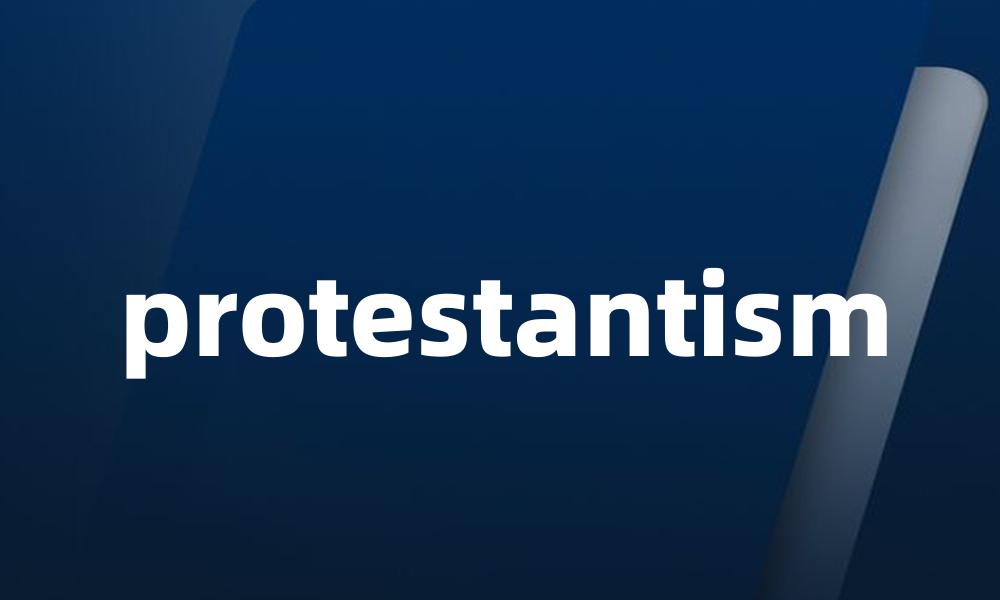
protestantism
形容词 1. protestant: 新教的,新教徒的 名词 1. 新教,新教派: the branch of Christianity that originated from the Protestant Reformation in the 16th century, rejecting the authority of the Pope and the Roman Catholic Church 2. 新教徒: a person who follows the principles of Protestantism 词语辨析 1. Protestantism vs. Catholicism - Protestantism: emphasizes the importance of faith, personal interpretation of the Bible, and individual relationship with God - Catholicism: emphasizes the authority of the Pope, sacraments, and the hierarchy of the Church 2. Protestant vs. Protestantism - Protestant: refers to an individual who belongs to a Protestant denomination or adheres to Protestant beliefs - Protestantism: refers to the broader religious movement and the collective beliefs and practices of Protestant denominations 词汇扩充 1. Protestant Reformation: 新教改革,指16世纪的宗教改革运动,导致新教派的形成 2. Protestant denomination: 新教派别,指在新教中形成的不同教派或教会 3. Protestant church: 新教教会,指新教徒聚会礼拜的场所 近义词 1. Reformation: 改革,指宗教或社会的重大变革 2. Protestant Christianity: 新教基督教 反义词 1. Catholicism: 天主教 柯林斯词典(Collins Dictionary) noun 1. a member or follower of any of the Western Christian churches that are separate from the Roman Catholic Church and follow the principles of the Reformation, including the Baptist, Presbyterian, and Lutheran churches 2. the beliefs, practices, or movement of any of the Protestant churches 牛津词典(Oxford Dictionary) noun 1. the faith, practice, and church order of the Protestant churches用法
- Protestantism is one of the major branches of Christianity. - Many Protestant denominations have their own distinct beliefs and practices. - Martin Luther played a significant role in the Protestant Reformation.相关的例句
- The majority of the population in this country practices Protestantism. 这个国家的大多数人信奉新教。
- He converted to Protestantism after years of being a Catholic. 他在成为天主教徒多年后改信了新教。
- Protestant churches emphasize the importance of personal faith. 新教教会强调个人信仰的重要性。
- There are various Protestant denominations, such as Baptist, Methodist, and Presbyterian. 有各种不同的新教派别,如浸信会、卫理公会和长老会。
- Protestantism originated from the Protestant Reformation in the 16th century. 新教派起源于16世纪的新教改革。
- He wrote a book about the history of Protestantism in Europe. 他写了一本关于欧洲新教史的书。
- She is a devout Protestant and attends church every Sunday. 她是个虔诚的新教徒,每个星期天都去教堂。
- Protestantism and Catholicism have different views on the role of the Pope. 新教和天主教在教宗的角色上有不同的观点。
- My family has been practicing Protestantism for generations. 我的家族世世代代都信奉新教。
- He studied theology and became a Protestant minister. 他学习神学后成为了一名新教牧师。
- Protestant churches place a strong emphasis on the authority of the Bible. 新教教会非常强调圣经的权威。
- Protestantism spread rapidly throughout Europe during the Reformation. 在改革时期,新教派迅速传播到整个欧洲。
- There was a heated debate between Catholicism and Protestantism during the conference. 在会议期间,天主教和新教之间进行了激烈的辩论。
- She decided to convert to Protestantism after studying the Bible extensively. 她在广泛研读圣经后决定改信新教。
- Protestantism places a strong emphasis on individual interpretation of the scriptures. 新教派非常强调对经文的个人解释。
- Some Protestant denominations allow women to become ordained ministers. 一些新教派别允许女性成为被授予牧师资格。
- The Protestant church was built in the 19th century and has beautiful stained glass windows. 这座新教教堂建于19世纪,有漂亮的彩色玻璃窗。
- He attended a Protestant school during his childhood. 他在童年时期就读了一所新教学校。
- Protestant Christianity has experienced various schisms and divisions over the centuries. 新教基督教在几个世纪里经历了各种分裂和分歧。
- Many Protestant churches celebrate the Reformation Day on October 31st. 许多新教教会在10月31日庆祝宗教改革日。

 小皮
小皮